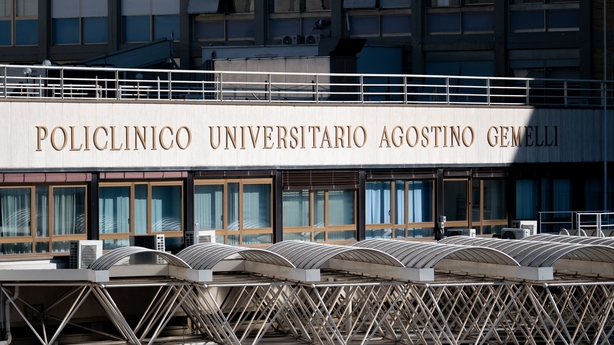Pope Francis, who is in hospital with a respiratory infection, is in a stable clinical condition and does not have a fever, the Vatican has said in a statement.
The Holy See Press Office said the Pope is continuing to receive the prescribed therapy.
It said he received the eucharist and then dedicated himself to some work activities.
Earlier, doctors changed treatment for Pope Francis' respiratory tract infection to tackle a "complex clinical situation".
The Vatican said he will remain in hospital for as long as necessary.
The 88-year-old pontiff has been suffering from a respiratory infection for more than a week and was admitted to Rome's Gemelli hospital on Friday.
"The results of the tests carried out in recent days and today have demonstrated a polymicrobial infection of the respiratory tract, which has led to a further modification of the therapy," said a brief statement.
"All tests conducted up to today are indicative of a complex clinical picture that will require an appropriate hospital stay," it said.
Vatican spokesman Matteo Bruni said the pontiff was "in good spirits".
We need your consent to load this rte-player contentWe use rte-player to manage extra content that can set cookies on your device and collect data about your activity. Please review their details and accept them to load the content.Manage Preferences
He did not specify whether the pope was suffering from a bacterial or viral infection.
While a bacterial infection can be treated with antibiotics, viral infections cannot. Viruses usually have to run their course, but the patient can be assisted with other medicines to bring down a fever or help their body fight the infection.
A polymicrobial infection is one caused by two or more micro-organisms, and can be caused by bacteria, viruses, or fungi.
Rev Dr Andrea Vicini, a Jesuit priest and medical doctor, said polymicrobial is a generic term that does not specify an infection's root cause.
Rev Dr Vicini, who said he did not have knowledge of the pope's case beyond the Vatican's public statements, also said it was notable that the Vatican had said earlier today that the pope ate breakfast, indicating that he was not on a respirator.
"It also means the body is not debilitated to the point of not being able to take food and digest it," said the professor at Boston College.
Francis, who has been pontiff since 2013, has had influenza and other health problems several times over the past two years.

As a young adult he developed pleurisy and had part of one lung removed, and in recent times has been prone to lung infections.
The Vatican said the pope's weekly audience in St Peter's Square, set for Wednesday, had been cancelled "due to the continued hospitalisation of the Holy Father".
The pope's doctors had earlier ordered complete rest, and Francis was unable to deliver his regular weekly prayer yesterday in St Peter's Square or lead a special mass for artists to mark the Catholic Church's Jubilee Year.
'Quite worried about Pope's absence'
People visiting the Vatican offered their hopes that Pope Francis would recover soon.
"We certainly wish for him to get better very quickly," said Fr Tyler Carter, a Catholic priest from the United States. "He is our father and our shepherd, and so we want his continued health and blessing."
Manuel Rossi, a tourist from Milan, Italy, said he was "quite worried" when the pope cancelled his appearance on Sunday.
"I am 18 years old, so I have seen few popes in my life, and am very close to him," said Mr Rossi. "I hope he recovers as soon as possible."
While in hospital over the weekend, the pope continued his recent practice of making phone calls to speak with members of a Catholic parish in Gaza, Italian broadcaster Mediaset has reported.
One of the parish members said Pope Francis had called on both Friday and Saturday and was in "good spirits" but sounded "a bit tired".
"Thank you for the affection, prayer and closeness with which you accompany me in these days," Pope Francis wrote on X yesterday.

